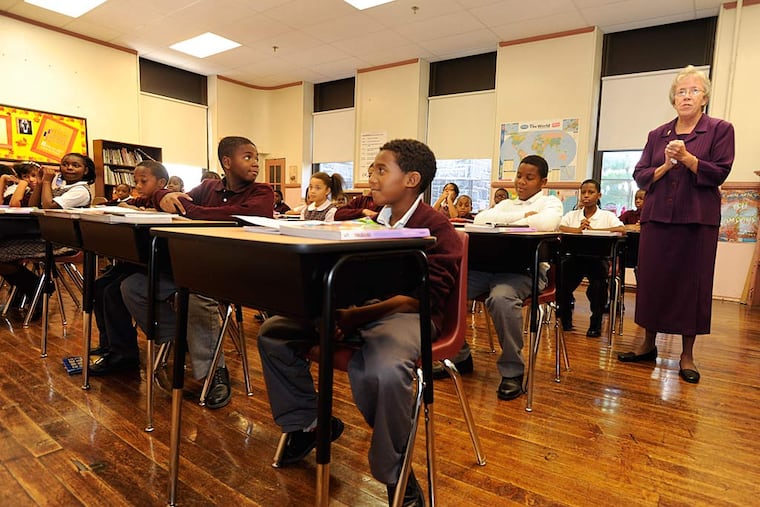3 steps to ensure that Pa.’s private and Catholic school students can go back to class | Opinion
Thousands of Philly Catholic school students face an uncertain future: Private schools elsewhere are permanently shutting down due to economic concerns.

Lilian is an energetic elementary student at St. Martin de Porres Catholic School in North Philadelphia. She loves math, loves her school, and reads three years beyond grade level. When schools closed due to COVID-19 on March 13, Lilian and her classmates stepped up to the challenge of virtual learning — and she’s been thriving.
But thousands of Philly Catholic school students face an uncertain future: Private schools elsewhere are permanently shutting down due to economic concerns.
Across the river, the Diocese of Camden announced five South Jersey Catholic schools are shutting down for good. Then came news that two Diocese of Harrisburg schools would close. And in Baltimore, a Catholic girls’ school that served its community for nearly 200 years has shuttered for good.
Philadelphia’s Catholic schools could be next — and the consequences would overwhelm the School District.
Lilian’s school serves a community where the median household income is less than $25,000. The school is part of Independence Mission Schools, a network of Catholic schools serving 5,000 pre-K-8 low-income kids throughout Philadelphia. Lilian’s family can only afford a Catholic education through a tax-credit scholarship from the Children’s Scholarship Fund Philadelphia.
If Philadelphia Catholic schools shut down, students from low-income families will have few options: their zip code assigned district school or charter schools with long waitlists. But kids in district schools would also suffer — a sudden influx of students would shock the system.
The fact is, private schools are a huge benefit to district schools in Philadelphia and across the state. Pennsylvania school districts spend $18,000 per student on average. Each student educated outside that system, therefore, reduces the school district’s costs. Since education dollars don’t freely follow children to their school of choice, each private school student represents an $18,000 gift to public education.
Considering there are 50,000 private school kids in the Philadelphia region, and 200,000 in Pennsylvania, the implications are staggering. Private schools save school districts billions of dollars each year while reducing districts’ classroom size.
Mass private school closures could increase Pennsylvania’s education costs by $1 billion or more as students flood to district schools, according to an EdChoice study. If just 30% of private school students could no longer attend their school, Philadelphia-area district schools would face an influx of 15,000 kids. School districts already under strain — like Philadelphia, Harrisburg, and Pittsburgh — will suffer the most.
To ensure our kids’ education isn’t another victim of the coronavirus, we must focus on three immediate solutions.
First, federal stimulus funding from the CARES Act must be accessible to all children. The act contains two funds, the Elementary and Secondary School Emergency Relief Fund (ESSER) and the Governor’s Emergency Education Relief Fund (GEER), through which Pennsylvania schools will receive roughly $625 million.
While private school students are entitled to “equitable services” from school districts under ESSER, they will receive no direct funding. But Gov. Tom Wolf has the authority to issue grants from the governor’s fund that will benefit families of all school types. Since private schools educate around 12% of Pennsylvania students, Wolf should grant a proportionate share of CARES Act aid, $75 million, to private school students.
Second, lawmakers and the governor should establish a $2,000 “Back on Track” education scholarship account (ESA) for every student to compensate for fourth-quarter educational services school districts couldn’t provide during the coronavirus shutdown. These parent-controlled accounts would help families pay for at-home learning expenses, including online classes, curriculum, and tutoring — and prepare students to return to school in fall.
Third, Pennsylvania’s existing tax-credit scholarship programs must be preserved and expanded. These programs allow individuals and businesses to give back to their communities by investing in private school scholarships in return for a partial tax credit. Private schools are critical components of our education system. Without them, all students will be worse off.
State leaders should leverage all available options to ensure students can still receive the education they deserve and need. For kids like Lilian, the best time to act was yesterday. The second-best time is now.
Charles Mitchell is the president and CEO of the Commonwealth Foundation, Pennsylvania’s free-market think tank.